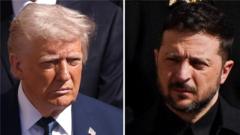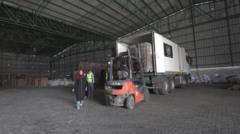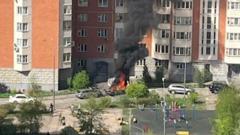In a recent development, Russian officials announced the complete reclamation of Kursk following months of conflict, while Ukraine categorically denies these claims, suggesting they are merely propaganda. This situation emerges amidst international diplomatic discussions regarding potential peace negotiations between the two nations.
Tensions Escalate as Russia Claims Full Control of Kursk Amid Ongoing Ukraine Counteroperations

Tensions Escalate as Russia Claims Full Control of Kursk Amid Ongoing Ukraine Counteroperations
Russia asserts it has secured the Kursk region, while Ukraine counters claims, asserting continued operational presence and resistance in the area.
In the latest update on the ongoing conflict between Russia and Ukraine, Russia's military chief, Valery Gerasimov, declared a full reclamation of the Kursk region during a video conference with President Vladimir Putin. This announcement marks a significant claim, occurring eight months after Ukrainian forces initiated an unexpected incursion into the area.
Ukraine has vehemently refuted Russian assertions, labeling the announcement as "propaganda tricks." The Ukrainian military maintains that its forces continue to conduct operations within Kursk, asserting that they have not retreated completely despite facing off against approximately 70,000 Russian troops and persistent drone assaults.
During the meeting on Saturday, Gerasimov indicated that the last Ukrainian stronghold in the region, the village of Gornal, has reportedly been liberated. He praised the efforts of North Korean troops in aiding Russian operations, a statement likely designed to showcase international support for Russia's position.
Putin echoed Gerasimov's sentiments, claiming that Ukraine’s military endeavors in the Kursk region amounted to a complete failure. He suggested that these developments could facilitate further advances by Russian forces on multiple fronts.
Contrarily, the Ukrainian military's general staff acknowledged the battlefield challenges but insisted on their active presence in Kursk and ongoing operations into the Belgorod region of Russia. The strategic aim of Ukraine's incursion into Kursk was to create a buffer zone that would inhibit Russian deployments toward Ukraine's eastern frontline, a goal that appears increasingly at risk following Russia's claims.
Tensions regarding potential peace negotiations have been amplified amid these military developments. Recently, former US President Donald Trump suggested that Russia and Ukraine are nearing a possible agreement to end hostilities. However, Ukrainian President Volodymyr Zelensky expressed the necessity of securing a "full and unconditional ceasefire" prior to any agreement, all the while facing pressure to consider territorial compromises that might include conceding control over Crimea.
As the situation unfolds, the implications for regional stability continue to grow, with both sides preparing strategically for what appears to be an ongoing and complex conflict.
Ukraine has vehemently refuted Russian assertions, labeling the announcement as "propaganda tricks." The Ukrainian military maintains that its forces continue to conduct operations within Kursk, asserting that they have not retreated completely despite facing off against approximately 70,000 Russian troops and persistent drone assaults.
During the meeting on Saturday, Gerasimov indicated that the last Ukrainian stronghold in the region, the village of Gornal, has reportedly been liberated. He praised the efforts of North Korean troops in aiding Russian operations, a statement likely designed to showcase international support for Russia's position.
Putin echoed Gerasimov's sentiments, claiming that Ukraine’s military endeavors in the Kursk region amounted to a complete failure. He suggested that these developments could facilitate further advances by Russian forces on multiple fronts.
Contrarily, the Ukrainian military's general staff acknowledged the battlefield challenges but insisted on their active presence in Kursk and ongoing operations into the Belgorod region of Russia. The strategic aim of Ukraine's incursion into Kursk was to create a buffer zone that would inhibit Russian deployments toward Ukraine's eastern frontline, a goal that appears increasingly at risk following Russia's claims.
Tensions regarding potential peace negotiations have been amplified amid these military developments. Recently, former US President Donald Trump suggested that Russia and Ukraine are nearing a possible agreement to end hostilities. However, Ukrainian President Volodymyr Zelensky expressed the necessity of securing a "full and unconditional ceasefire" prior to any agreement, all the while facing pressure to consider territorial compromises that might include conceding control over Crimea.
As the situation unfolds, the implications for regional stability continue to grow, with both sides preparing strategically for what appears to be an ongoing and complex conflict.






















